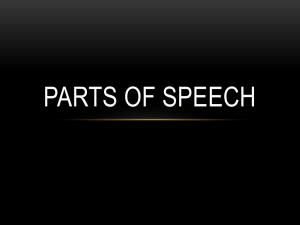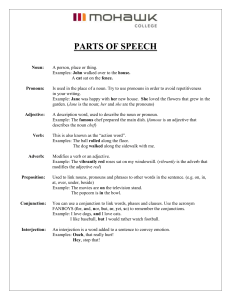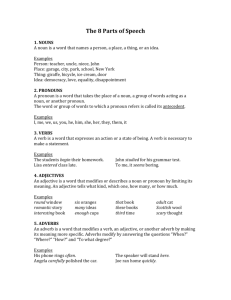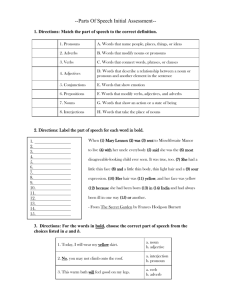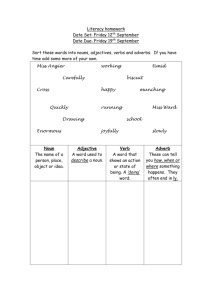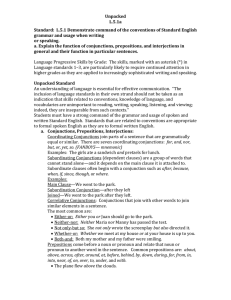8 Parts of Speech
advertisement
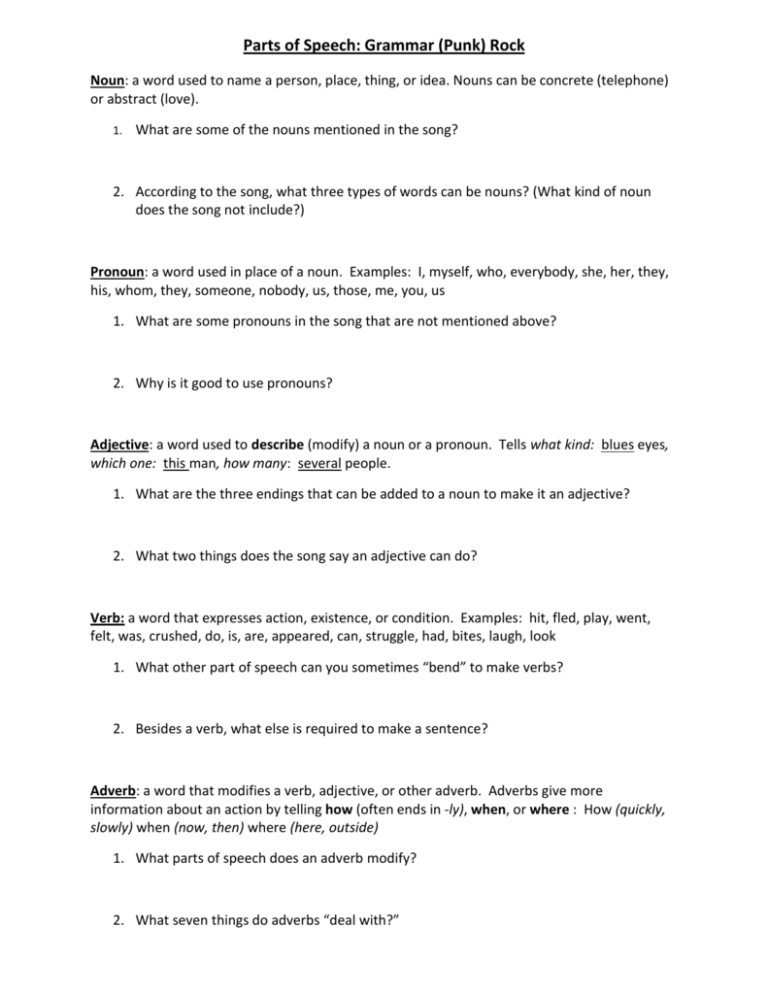
Parts of Speech: Grammar (Punk) Rock Noun: a word used to name a person, place, thing, or idea. Nouns can be concrete (telephone) or abstract (love). 1. What are some of the nouns mentioned in the song? 2. According to the song, what three types of words can be nouns? (What kind of noun does the song not include?) Pronoun: a word used in place of a noun. Examples: I, myself, who, everybody, she, her, they, his, whom, they, someone, nobody, us, those, me, you, us 1. What are some pronouns in the song that are not mentioned above? 2. Why is it good to use pronouns? Adjective: a word used to describe (modify) a noun or a pronoun. Tells what kind: blues eyes, which one: this man, how many: several people. 1. What are the three endings that can be added to a noun to make it an adjective? 2. What two things does the song say an adjective can do? Verb: a word that expresses action, existence, or condition. Examples: hit, fled, play, went, felt, was, crushed, do, is, are, appeared, can, struggle, had, bites, laugh, look 1. What other part of speech can you sometimes “bend” to make verbs? 2. Besides a verb, what else is required to make a sentence? Adverb: a word that modifies a verb, adjective, or other adverb. Adverbs give more information about an action by telling how (often ends in -ly), when, or where : How (quickly, slowly) when (now, then) where (here, outside) 1. What parts of speech does an adverb modify? 2. What seven things do adverbs “deal with?” Preposition: a word used to show the relationship of a noun or pronoun to some other word/phrase in the sentence. A preposition is always part of a phrase. Common prepositions: about, above, across, after, against, along, amid, among, around, at, before, behind, below, beneath, beside, between, beyond, by, concerning, down, during, except, for, from, in, of, on, to, with, within, up 1. Why is the metaphor of the “busy” bugs appropriate for prepositions? 2. What are the most common prepositions? Conjunction: a word which joins words and groups of words. The most common conjunctions are the FANBOYS words: for, and, nor, but, or, yet, so. (Other words are sometimes used as conjunctions: either, neither, although, whereas, if, both, before, until, because, since, as, while, whether.) 1. What are the three most common conjunctions mentioned in the song? 2. What are each of them used for? Interjection: a word that expresses emotion and has no grammatical relation to other words in the sentence. Interjections usually appear at the beginning of a sentence. Examples: oh, ah, hurray, my goodness, ouch, alas, bravo, ha, yippee, mercy, sure, wow, hey, oh no, yikes 1. What punctuation marks usually separate an interjection from a sentence? 2. What two things are interjections used to show? Indicate the part of speech of each underlined word. From “Jabberwocky” by Lewis Carroll `Twas brillig, and the slithy toves Did gyre and gimble in the wabe: All mimsy were the borogoves, And the mome raths outgrabe. "Beware the Jabberwock, my son! The jaws that bite, the claws that catch! Beware the Jubjub bird, and shun The frumious Bandersnatch!"



